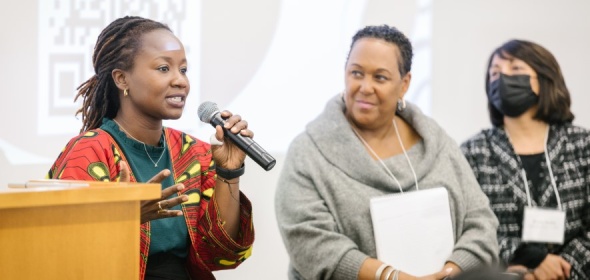By the California Improvement Network Team
Photo of Stella Safo, Karyn Young-Lowe, and Sunita Mutha at the CIN partner meeting in March 2023 (photo credit: Sonya Yruel).
While many health care organizations recognize the urgency of addressing inequities in health, efforts to do so are often slow, incremental, or incomplete. The health care system at large struggles to meaningfully incorporate and center “end users” of services (such as patients, administrative staff, and others who participate in the health care system regularly) in the feedback and co-design processes.
At the March 2023 convening for the California Improvement Network (CIN), Dr. Stella Safo, an HIV primary care physician and founder of Just Equity for Health (JEH), highlighted the foundational need for co-creation between health systems and community-based groups to address the social drivers of health and bring about meaningful structural change. CIN, a network run by Healthforce Center at UCSF and funded by the California Health Care Foundation (CHCF), brings together health care and community-based organizations to strengthen relationships and build collaborations to improve equitable health.
Safo offered reasons for why such collaborations often fall short, such as insufficient resources, limited expertise in incorporating community voices in health care design, and the fear of failure. Through her years of professional and lived experience, Safo highlighted the importance of bi-directional communication in the health care system and urged health care organizations to employ a systems-thinking approach to ensure that the voices of those most impacted are heard, centered, and addressed.
Even when organizations have the best intentions to incorporate community voices, they may not be successful if the conditions for co-creation are insufficient. For example, not adequately compensating community members for their time and input, setting meetings during work hours, or requiring people to travel to the health centers, may mean that only those who have the ability and resources to participate are heard from.
A lack of knowledge on how to be intentional in these efforts is another challenge and one that can lead to a fear of failing or limited actions due to worry about any legal ramifications. It is imperative that these realities are considered and acknowledged to maximize community voices in co-design efforts and create health systems that are responsive and community centered.
It’s often the fear of starting from nothing at all that prevents people from wanting to do this kind of equity-based redesign work. — Dr. Stella Safo
So how does the health care system begin to overcome these challenges and strive for meaningful change? Safo offers three main interventions that her organization employs:
- Let communities lead.
- Create multiple points of accountability.
- Develop a customized equity framework.
Read the complete article now.
